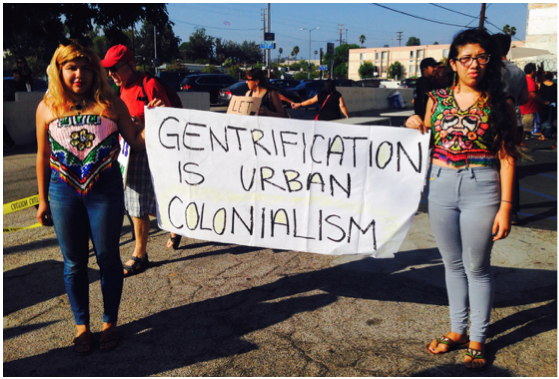CommentsSTREET LEVEL REALITY-Los Angeles politicians and developers dread saying the words “gentrification” and “displacement.” In fact, Mayor Eric Garcetti rarely utters the g-word in public. It causes all kinds of political headaches, so they resort to using code words that are more palatable for public consumption.
That’s especially true if a developer wants to build a luxury-housing project in a working- or middle-class neighborhood that will fuel gentrification. To get around that glaring fact, politicians and developers use words that make luxury projects sound fabulous, but gloss over street-level realities.
In no specific order, here are the most common code words for gentrification in LA. The media will also use this code, by the way.
Let’s say a developer wants to build a 500-unit luxury-housing complex in your working- or middle-class neighborhood. City Hall politicians and bureaucrats love the mega-project, and they talk endlessly about how your neighborhood will be “revitalized.” Watch out. “Revitalize,” “revitalization” and “revitalizing” are City Hall code words for gentrification.
Sure, a neighborhood may be “revitalized,” but that’s done by swapping out lower-income residents who fall victim to gentrification for more affluent people who can afford high rents or luxury condos. The neighborhood is revitalized only for those who have the big bucks.
If you hear LA politicians talk about “disruption.” That’s another red flag.
They’ll say that “disruption” is unfortunate but necessary to bring about “progress.” That so-called progress often involves a luxury-housing project with high rents that longtime, less affluent residents can’t afford. That so-called progress also involves rising rents in the area surrounding the luxury development.
Disruption, in other words, is what gentrification does to the lives of working- and middle-class residents. The affluent are not being disrupted.
“Progress” is another code word. Politicians and developers often throw it around when trying to paint opponents as backward-thinking fools. But they’ll never stop to give a detailed definition of progress and who’s included in it.
Does progress, for example, include more public parks, affordable housing and affordable grocery stores in a working-class community? Or does progress mean more luxury housing and expensive restaurants that working-class residents can’t afford and will ultimately cause them to move out of the neighborhood? If it’s the latter, progress means gentrification.
“Neighborhood change” is another one — and one of City Hall’s favorites. Also, “mass-scale change of demographics.” When spoken in the context of what’s happening to the population in a working- or middle-class community, LA politicians are using doublespeak so they can avoid the word gentrification.
To round out the list, and there are undoubtedly more code words, we have “renewal” and “renovation.” They sound good, but a heavy price tag often comes with them.
A luxury-housing redevelopment with expensive shops and restaurants in a working- or middle-class community will certainly bring renewal and renovation, but it will cater to the affluent. For working- and middle-class residents, that high-end renewal will be too pricey — gentrification and displacement will follow.
To sum up, when LA politicians and developers start talking about “revitalization,” “disruption,” “progress,” “neighborhood change,” “mass-scale change of demographics,” “renewal” and “renovation” for your working- or middle-class neighborhood, get ready for a battle. Gentrification is what they really have planned for your community.
(Patrick Range McDonald is website editor and senior researcher at Coalition to Preserve LA.) Prepped for CityWatch by Linda Abrams.
-cw
















